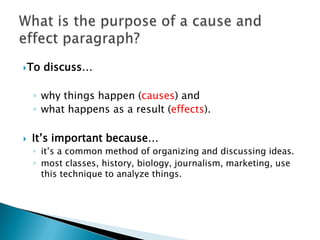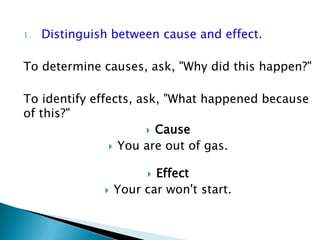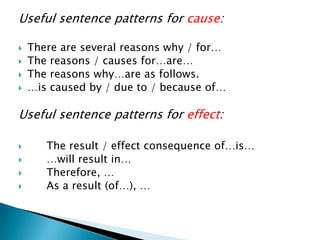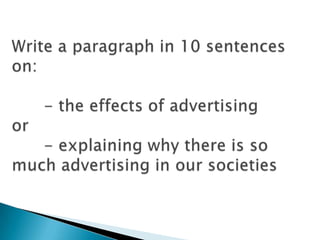Cause and-effect paragraph
- 2. ?To discuss¡ ? why things happen (causes) and ? what happens as a result (effects). ? It¡¯s important because¡ ? it¡¯s a common method of organizing and discussing ideas. ? most classes, history, biology, journalism, marketing, use this technique to analyze things.
- 3. 1. Distinguish between cause and effect. To determine causes, ask, "Why did this happen?" To identify effects, ask, "What happened because of this?" ? Cause ? You are out of gas. ? Effect ? Your car won't start.
- 4. ? For example 1.In some areas, water levels will fall; as a result , ( cause ) these areas will no longer be able to support agriculture. (effect)
- 5. 2. Most experts are convinced that the greenhouse ( cause ) effect is irreversible; therefore, they advise us to ( effect ) plan now for how best to cope with a changing world.
- 6. ? Sometimes, many causes contribute to a single effect or many effects may result from a single cause.
- 7. ? Hereditary influences ? Lack of exercise ? Slow metabolic rate Obesity ? Overeating
- 8. Blood sugar imbalances Excessive Tooth decay consumption of Hyperactivity in children Sugar Weight gain
- 9. ? However, most situations are more complicated. The following is an example of a chain reaction: ? Thinking about friend¡forgot to buy gas¡car wouldn't start¡missed math exam¡failed math course.
- 10. ? Listing Causes ? Listing Effects ? Organizer
- 11. 2. Develop your thesis statement. State clearly whether you are discussing causes, effects, or both. Introduce your main idea, using the terms "cause" and/or "effect."
- 12. 3. Find and organize supporting details. Back up your thesis with relevant and sufficient details that are organized. You can organize details in the following ways: ? Chronological: Details are arranged in the order in which the events occurred. ? Order of importance: Details are arranged from least to most important or vice versa. ? Categorical: Details are arranged by dividing the topic into parts or categories.
- 13. Cause ?for ?because ?since ?due to ?one cause is ?another is, ?first, second, ?in view of, ?result in, contribute to, ?cause, affect, influence ?lead to Effect ?so ?but ?for this reason ?as a result ?consequently ?otherwise ?therefore ?thus ?because of this, ?hence ?resulted in, ?one result is, another is, *Transition words/phrases *Verbs
- 14. Useful sentence patterns for cause: ? There are several reasons why / for¡ ? The reasons / causes for¡are¡ ? The reasons why¡are as follows. ? ¡is caused by / due to / because of¡ Useful sentence patterns for effect: ? The result / effect consequence of¡is¡ ? ¡will result in¡ ? Therefore, ¡ ? As a result (of¡), ¡
- 15. ? Introduction (1 or 2 sentences) The background introduces the audience to your topic, while the thesis statement indicates which points you will discuss in your essay.
- 16. Background information Gets reader¡¯s attention using one or more of the following: ? Anecdotes ? Quotations ? Questions ? Facts and statistics ? Ex 1: In one of my college classes this semester, we were required to do an act of kindness for the elderly. ? Ex 2: In Western countries, the elderly are often living alone or sent to a nursing home.
- 17. Thesis Statement = Topic sentence ? States the subject and focus of the paragraph/essay A good thesis statement: - Identifies the subject of the essay. - States the purpose of the essay. - Tells the focus of the subject. Ex: An act of kindness for the elderly can result in new friendships, less loneliness, and the possible discovery of a career path.
- 18. ? Body: (6 sentences) ? 1) List your points or statements. ? 2) List your supporting details (statistics, facts, anecdotes, or your personal observations) ? 3) develop your 3 points in sentences.
- 19. Conclusion (1 or 2 sentences) ? Summarize all that you have said before in your concluding sentence. ? Asks a question or ? Suggests a solution or ? Makes a recommendation or ? Makes a prediction
- 21. Headaches Headaches can have several causes. One obvious cause is stress. People have hectic lives and frequently have multiple stressors everyday, like work, family and money. Another reason for headaches in some people has to do with diet. Some get headaches because they are dependent on caffeine. Other people may be allergic to salt, or they may have low blood sugar. The environment can also cause this uncomfortable condition. Allergens such as household chemicals including polishes, waxes, bug killers, and paint can lead to headaches. Lowering stress, controlling your diet and avoiding allergens can help avoid headaches.
- 22. Advertising Advertisements are one of the most frustrating parts of watching television. The reasons for this are as follows. In the first place, owing to the frequent advertisements, much time is wasted. In the second place, the advertisements interrupt the viewers, which leads to the viewers losing their appetite for the good show. In the third place, they make people under constant economic pressure because the ads make many products look more attractive than they really are. Since ads could not disappear from TV screen, the television viewers must be aware and critical of the advertisements in order to endure them.






















